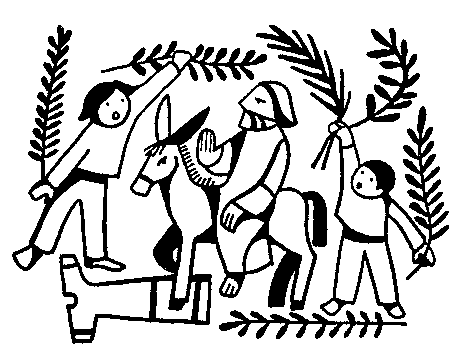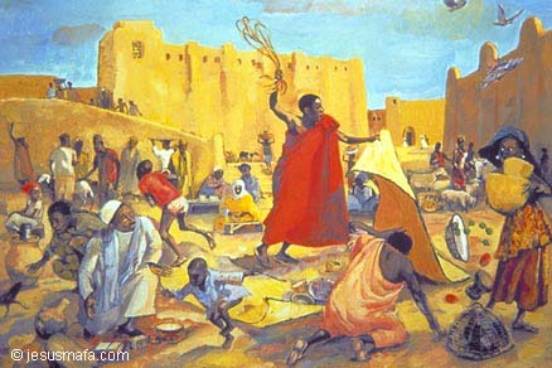This is not a blog about being a Christian. It's a blog about Jesus and what he said and did and what it means to be a follower of Jesus. Follow if you dare!
Wednesday, August 21, 2013
Sunday, August 4, 2013
Did Jesus Declare that He was the Messiah?
 |
| "Blessed are the cheesemakers?" |
And why shouldn't they be questioning this fact? John reports that the crowds who listened to Jesus were confused as to what he was saying. There were debates both about what he was saying and about his qualifications to be the Messiah.
Jesus talked much about "the Son of Man", but that title could mean many things and it wasn't completely clear that he was speaking about himself.
Peter called Jesus "the Messiah", which Jesus didn't directly affirm in the book of Mark, and told the disciples not to speak about this.
Demons openly proclaimed him "the son of God" a messianic title, but Jesus told them to shut up.
Jesus accepted titles that declared his Lordship, like "Son of David" or "the Son of God" but he never affirmed them. Was he just being polite?
All of this is quite confusing, really. And many other indications, from a critical standpoint aren't absolute, such as later declarations by disciples or claims of fulfilled prophecies which could be interpreted many ways.
I think that the problem is that such scholars limit their scope to what Jesus said and aren't looking at what he did. Jesus purposefully made his speech confusing, so that it might only be understood in combination with his actions. What did his actions say? There are four items that, from a scholarly standpoint, seem affirmed about Jesus' life.
1. Jesus healed
John the Baptist asked Jesus through messengers whether he was the "one" they waited for or not. Jesus only demonstrated who he was, he didn't speak it. "They blind can see, the deaf hear, the lame walk, the lepers are cleansed and the poor have the gospel preached to them." These are actions that should happen at the center of God's kingdom, the temple. Instead, Jesus himself was acting like a mobile temple, leaving healing and salvation in his wake. This is again vague, but to heal is to claim to have the center of God's power on earth, to be the center of God's kingdom.
2. Jesus entered Jerusalem on a colt
This action wasn't just some strange ritual but was a clear declaration of Jesus' intentions that the leaders and people of Jerusalem clearly understood. They knew that to enter Jerusalem on a colt with a number of disciples declaring his victory was a clear reference to Zechariah 9-- "Rejoice greatly, O daughter of Zion! Shout in triumph, O daughter of Jerusalem! Behold, your king is coming to you; He is just and endowed with salvation, Humble, and mounted on a donkey, Even on a colt, the foal of a donkey." This does not mean that the inhabitants of Jerusalem believed in Jesus because of this fulfillment. Rather, they would see this Galilean woodworker as an upstart. However, this action clearly speaks to Jesus' intention-- that he is the king of Jerusalem, the Messiah.
3. Jesus cleansed the Temple
In the first century there were multiple, even contrary, ideas of what the Messiah was. The term means "anointed one" and there were three offices in ancient Israel in which one could be anointed: King, prophet or priest. Some declared that the Messiah already arrived in the person of the High Priest, who, for all purposes, acted like a king over the Jewish people. The real target of Jesus wasn't Herod or the Romans, but the High Priest and his power base-- the Sanhedrin and their representatives through the synagogue system. It was this well-organized, structured theocracy that Rome feared.
When Jesus entered Jerusalem the day after his colt declaration, he re-ordered the Temple according to love. The High Priest had approved of money exchange agents to set up their tables within the temple, in the only place where women and Gentiles could worship YHWH. Jesus got rid of them, making room for true worship. In changing the High Priest's policy, Jesus was declaring himself the replacement High Priest, the one who can order the temple. Thus Jesus declared himself the anointed King of Jerusalem and the anointed Priest of Jerusalem.
4. Jesus was crucified
You couldn't just steal something in the Roman empire and get crucified. When modern translations declare some of those crucified to be "thieves", they give a wrong impression. You had to be a non-citizen in open rebellion against Rome to be crucified. These "thieves" weren't just robbers, but they saw themselves as Robin Hood-- bandits in opposition to an oppressive government, targeting wealthy Romans, or Roman supporters.
For Jesus to be crucified, it means that he was seen to be a rebel against Rome. None of his actions would seem to be worthy of that. Teaching, healing, discussing interpretation of the law, even rebuking priests and elders are nothing to be crucified over. But to declare oneself a king in direct opposition to Caesar's rule is certainly a rebellious act.
If Jesus' act of entering Jerusalem on a colt is seen as declaring messiahship, if Jesus did make a statement about coming in the clouds of heaven to the Sanhedrin, if he claimed to replace the high priest though his actions in the temple, then there is enough evidence for him to be declared a rebel, and to be crucified. Certainly it is evidence that Jesus' enemies felt they could say he was declaring himself to be Caesar's replacement.
Once scholars accept these four actions as declarations of messiahship, the rest of the story of the gospels falls into place and all the details make sense, not just as a story but as history.
The Silent Declaration of Jesus
When
God announced to Jesus that Jesus was to be the Messiah, the king of Jerusalem Jerusalem Jerusalem
In
ancient societies, if a king or emperor went out to war, and then came back to
his city victorious, those in the city would spread their coats in front of him
and palm branches, giving him honor as he came into the city. In the prophecies of the Jewish Scriptures,
it says that when the Messiah comes to Jerusalem
While staying at Lazarus, Mary and Martha’s house
one morning, Jesus approached his disciples and said, “Today we are going to
enter Jerusalem
Just outside of Jerusalem Jerusalem
After the victory parade, Jesus and
his disciples went directly to the temple area.
Jesus looked closely at all that was happening in the temple—some were
offering sacrifices, some were praying, and in the outer court (where the
Gentiles and women could worship) some were buying and selling animals for
sacrifices and exchanging Roman money for temple money, so visitors could buy
the sacrifices. After looking at all
this, Jesus said nothing, but went back to Bethany
The next day, Jesus and his
disciples returned back to Jerusalem Jerusalem
This action angered many
people. The ruling priests were upset
because they arranged for the selling to go on in the temple court. Others were upset at the implication that
Jesus had the right to enter Jerusalem
Subscribe to:
Posts (Atom)












